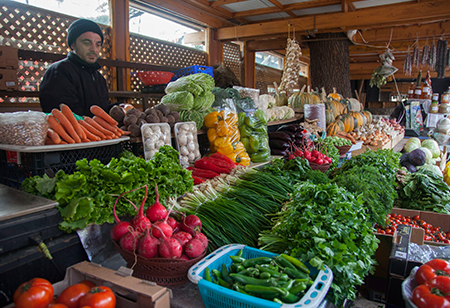Experts review Georgia’s food safety standards


Expert eyes have scrutinized the country’s food safety standards and compiled a report noting Georgia has a tough road ahead to develop and implement food safety standards that meet EU requirements.
International support agency OXFAM completed a comprehensive review of the food safety and nutrition security in Georgia – at national and individual levels – and noted the current situation presented a "high risk”.
OXFAM is an international confederation of 17 organisations working in approximately 94 countries worldwide to find solutions to poverty and injustice around the world.
The review noted in spite of Georgia signing various international agreements in the recent history, "food safety does not exist in the country”.
"Most food security is assured by means of remittances paid by Georgian nationals working abroad to their families. In 2014 remittances decreased significantly,” said Mikheil Jibuti, the report’s lead author and economic expert from Georgian Economists Association.
"Secondly, food security is somewhat assured by an increase in the national debt. Local agricultural production takes a third and last place in Georgian food security. Nutrition is rarely considered within any food security policy,” he said.
The review stated Georgia’s current food safety standards were inadequate and could not ensure the population with stable, high quality or appropriate food, even in non-crisis periods.

The review stated Georgia’s current food safety standards were inadequate. Photo by N. Alavidze / Agenda.ge.
"Due to a disproportion between the market prices of products and local income levels, the population cannot afford high quality food. Instead, they have ben reoriented towards the consumption of cheaper imported, low-quality or falsified products,” Jibuti stated.
"Local food production has not managed to compete with cheap and frequently subsidised imports and has thus decreased considerably. Due to these low levels of food self-sufficiency and low disposable incomes, there is a high probability of a worsening food security situation,” he warned.
"Georgia’s dependence on imports further increases food security risks as there are no state reserves or supplies to ensure food security in the face of global price fluctuations” he added.
The review noted the optimal limit of the ratio between local and imported products was 20 percent globally. However, Georgia imported more than 70 percent of its total consumed food. According to the National Statistics Office of Georgia, self-sufficiency coefficient for 2013 was: vegetables – 75 percent, beef – 39 percent, pork – 41 percent and poultry – 18 percent.
Risks to the availability of sufficient amounts of food
The availability of the necessary quantity of locally produced wheat in Georgia was only 12 percent.
Per capita in Georgia, people used less food products than the requirements for physiological well-being. The rate of actual consumption against these norms was estimated as:
- Bread and bread products – 81 percent;
- Potatoes – 63 percent;
- Vegetables – 38 percent;
- Meat and meat products – 33 percent; and
- Milk and dairy products – 33 percent.
These figures showed the overall consumption of food did not depend on the availability in the markets, but on high prices. Foods that were cheaper were more readily consumed.

In Georgia, basic nutrition levels were lower than established norms, stated the review. Photo by N. Alavidze / Agenda.ge.
"Because of poor purchasing power, consumers substitute bread for their main daily portion of energetic value. The consumption of bread and bread products exceeds the physiological norm by 1.8 – 2 times. This means that almost 62 percent of Georgians’ calories come from bread products, while in developed countries this does not exceed 15 percent,” Jibuti said.
Risks for food utilisation
In Georgia, basic nutrition levels were lower than established norms, stated the review. According to the World Bank (2006), nutrition security existed when food security was in compliance with sanitary conditions, the relevant level of healthcare, compulsory medical services and care and feeding – to ensure healthy lives for all members of the household.
"From a theoretical point of view, all probable risks are present in Georgia: nutrition is non-diversified and of poor quality” Jibuti said.
Based on the example of bread where almost 62 percent of the energetic value from food is derived from bread products for many people, it is imperative that the quality of bread be ensured. However, the review said there was a "very acute” problem in Georgia of low quality bread, meaning people were eating lots of bread but gaining little nutritional benefit in return.
Furthermore, Georgia does not produce dietetic and diabetic bakery products for children or the elderly.
Risks to food stability
In Georgia state reserves are non-existent. The report said: "there is no mechanism in place to ensure the population will have even a single product, for example bread, if prices skyrocket. This is true especially if the world market will not provide wheat. This increases the chance that a risk turns into a real threat during any emergency brought about by infrastructural causes or force majeure.”
 Tweet
Tweet  Share
Share